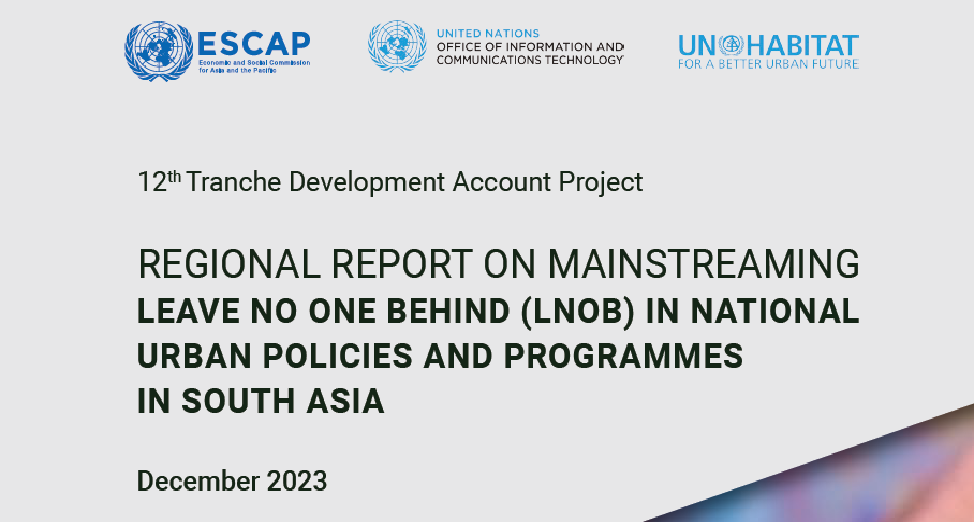
PUBLICATIONS
Regional Report on Mainstreaming Leave No One Behind in National Urban Policies and Programmes in South Asia
2024-01-12
- VIEW 130

Over the past few decades, the Asia-Pacific region has witnessed significant social development driven by economic growth, which has generated new jobs, increased labour incomes, strengthened social protection systems, and improved access to basic services and other amenities. Nevertheless, South Asian countries continue to face a wide range of systemic challenges that undermine inclusive and sustainable development. For example, the devastating social and economic impacts caused by the COVID-19 pandemic will continue to plague the subregion in the near future. In addition, widening inequalities continue to drive social divides and disproportionately impact the most discriminated and marginalized individuals and communities in society.
Similarly, governments across the subregion are yet to address worsening environmental crises. Climate change, environmental degradation, and biodiversity loss are projected to negatively transform the lives of people across South Asia and require interventions and transitions of an unprecedented scale. In particular, climate change and environmental degradation can have disproportionate and severe impacts on persons with disabilities. The pandemic has also added urgency to close digital gaps.
The digital divide has given a new face to inequality, as digital access has become one of the critical determinants of livelihoods, well-being, and recovery (ESCAP, 2021a). Addressing these challenges requires a holistic approach that incorporates the
rights and needs of persons with disabilities into closing the digital divide, and for climate change mitigation, adaptation, and disaster response strategies. Indeed, the principle of “Leave No One Behind” (LNOB) has come under serious strain globally, and there is a need to mainstream this principle in national and local urban policies and programmes. The 2030 Agenda for Sustainable Development provides a blueprint for peace and prosperity with the aim to eradicate poverty and reduce socioeconomic inequalities while also tackling climate change, ensuring sustainability and persevering the natural environment. Member States pledged that no one would be left behind in these efforts, that they would endeavour to address the needs of the furthest behind first, and are committed to achieving sustainable development for all nations and segments of society.
For the Asia-Pacific region, it is critical that LNOB should be integrated into all areas of sustainable development, particularly because the region is not on track to achieve any of the 17 SDGs, by 2030, and may achieve less than 10 per cent of the SDG
targets if it continues to follow on the current trajectory of progress (ESCAP, 2023). Furthermore, SDG 11, which requires making cities and human settlements inclusive, safe, resilient and sustainable, is also amongst the SDGs that have registered the least progress since 2000. Only 50 per cent of targets could be measured under SDG 11, and the region is likely to miss all targets, by 2030, if it continues on this current trajectory. This lack of progress has resulted in a number of development challenges, particularly in the rapidly urbanizing cities.
CONTENTS
1. Acknowledgements
2. List of Abbreviations
3. Executive Summary
4. Introduction
5. Overview of Regional Progress
6. Implementation of National Activities
7. Follow-Up Actions for Capacity-Building and Engagement at the Subregional Level
8. Good Practices and Policy Recommendations
9. Annex
10. References
To download the full report please click the 'PDF downloads' link at the bottom of the page. Or you may click HERE to visit the ESCAP website to access the report.









